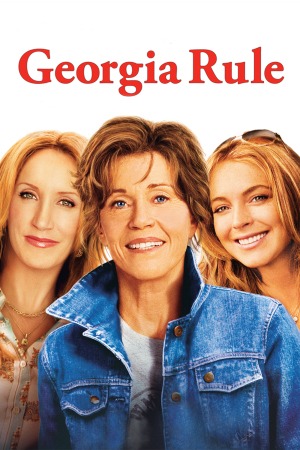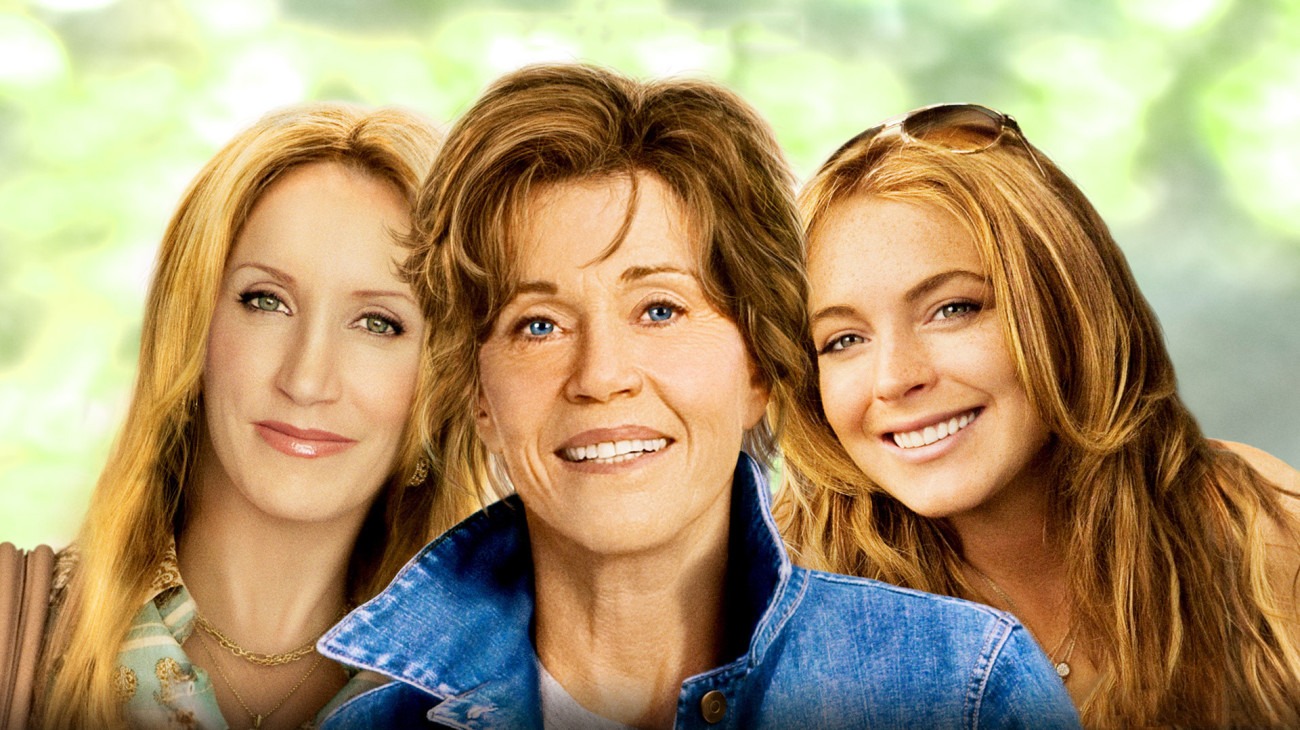
3 women, all of whom grate
If I were to ask of you: "Jane Fonda, Lindsay Lohan and Felicity Huffman are starring in a film together, whom do you think gave the most memorable performance," you would not likely answer, "Obviously, Lindsay Lohan, that high-talent little spitfire," and that is where you would be wrong. For it is indeed Ms. Lohan who gives the incredibly misbegotten Georgia Rule the closest thing it has to an actual spark.
Indeed, one might say if one were cruel that this is the role Lohan has been practicing for all her life: an oversexed, drugged-out, foul-mouthed teenager with a vast sense of entitlement named Rachel Wilcox. But there's more to it, I think, than just history's greatest Method performance. In these latter days of absent panties, crude Blackberry manifestos and video captures of cocaine use, it's easy to forget that she is actually a great actress when she sets her mind to it (which she has done but once; but she was so perfect in Mean Girls that even two decades years hence, when I'm watching a burned-out fucked-up LiLo playing the Shelly Winters role in a remake of Cleopatra Jones, I will sigh in the knowledge that a mere 25 years ago, she was destined to be the Next Big Thing). Her performance in Georgia Rule is not great, but it is good. It's just kind of hard to tell because of the repellent screenplay, which renders her character virtually unplayable (for most of the second hour, we have no idea at any given point if Rachel is lying or not about the film's central crisis, neither do we care).
That is, to be sure, a problem that Fonda and Huffman have to deal with as well; Fonda plays Georgia Randall, a snarky old lady in a tiny Idaho town who is "sassy" in that soullessly clinical way that Hollywood prefers: why, she says "fuck!" And old ladies don't say "fuck!" Ergo, she is sassy! Just look at her no-nonsense way of dealing with problems by hosing down people who cause her problems! Sadly, Fonda is perfectly content to coast on this most joylessly mechanical of character arcs. And I must ask: why has she come out of retirement now, to spoil the purity of a career that involved roles in Klute and Julia and even the better-than-it-really-is Barbarella, for scripts like this and Monster-in-Law? She can't need the money, and it's obviously not for the love of acting.
A propos of people who don't love acting: Felicity Huffman, one of my very favorite American actresses of the modern age, whose every performance is a nimble blend of ditziness and pathos. Until here. Huffman's disgust for this film and her role and her costar leaps off the screen. It is curdling. She mumbles and plays her drunk scenes far too broadly (and they are legion: she plays an alcoholic) and the whole thing is just an embarrassing shambles. And yet somehow I still walked out of the theater with my love for her intact, because if I were in that film, I hope I'd have been the same.
So what is this horrible story that I keep hinting at around the edges? Nothing less than: a fluffy comedy about a young woman who was repeatedly raped by her stepfather.
Here's the thing: Garry Marshall is a very consistent director, whose movies are not the product of a great artist but of a very proficient commercial craftsman. His films lack all personality, but they are all the exact same: a naughty twinkle sitting atop a resolutely unchallenging story about good people getting good things with not too much effort. Add a splash of vanilla pop music from about five years ago. Reinforce social norms, and serve.
That's a fine approach to making infinite variations on romantic comedies, but Georgia Rule is not romantic, and it is not comic. It is kind of horrifying and disturbing, actually, to see the chipper sentimentality of a Garry Marshall film married to a story about three generations of women who mistrust each other so fully that a mother is entirely unsure if her daughter is being honest or not when she lays the aforementioned rape bombshell down early on in the proceedings.
That is the core issue of the film, which it never ever rises above. A miserable comedy. Hooray. I spent a great deal of the film laughing, but it was always a nervous laughter, a kind of "dear God, is that actually happening onscreen?" The script is already imbalanced, trying to marry a horribly unpleasant story with a lark about small towns, but Marshall's presence pushes it into the Twilight Zone. I felt frankly creepy during the bulk of it, the parade of shiny happy people laughing and being clever and naughty while somewhere, there was going on a story about a familial breakdown so complete and traumatizing that I can imagine Ingmar Bergman directing the story. Whatever Garry Marshall's undeniable talents may be, dour Scandinavian nihilism is not likely to ever be counted among them.
3/10
Indeed, one might say if one were cruel that this is the role Lohan has been practicing for all her life: an oversexed, drugged-out, foul-mouthed teenager with a vast sense of entitlement named Rachel Wilcox. But there's more to it, I think, than just history's greatest Method performance. In these latter days of absent panties, crude Blackberry manifestos and video captures of cocaine use, it's easy to forget that she is actually a great actress when she sets her mind to it (which she has done but once; but she was so perfect in Mean Girls that even two decades years hence, when I'm watching a burned-out fucked-up LiLo playing the Shelly Winters role in a remake of Cleopatra Jones, I will sigh in the knowledge that a mere 25 years ago, she was destined to be the Next Big Thing). Her performance in Georgia Rule is not great, but it is good. It's just kind of hard to tell because of the repellent screenplay, which renders her character virtually unplayable (for most of the second hour, we have no idea at any given point if Rachel is lying or not about the film's central crisis, neither do we care).
That is, to be sure, a problem that Fonda and Huffman have to deal with as well; Fonda plays Georgia Randall, a snarky old lady in a tiny Idaho town who is "sassy" in that soullessly clinical way that Hollywood prefers: why, she says "fuck!" And old ladies don't say "fuck!" Ergo, she is sassy! Just look at her no-nonsense way of dealing with problems by hosing down people who cause her problems! Sadly, Fonda is perfectly content to coast on this most joylessly mechanical of character arcs. And I must ask: why has she come out of retirement now, to spoil the purity of a career that involved roles in Klute and Julia and even the better-than-it-really-is Barbarella, for scripts like this and Monster-in-Law? She can't need the money, and it's obviously not for the love of acting.
A propos of people who don't love acting: Felicity Huffman, one of my very favorite American actresses of the modern age, whose every performance is a nimble blend of ditziness and pathos. Until here. Huffman's disgust for this film and her role and her costar leaps off the screen. It is curdling. She mumbles and plays her drunk scenes far too broadly (and they are legion: she plays an alcoholic) and the whole thing is just an embarrassing shambles. And yet somehow I still walked out of the theater with my love for her intact, because if I were in that film, I hope I'd have been the same.
So what is this horrible story that I keep hinting at around the edges? Nothing less than: a fluffy comedy about a young woman who was repeatedly raped by her stepfather.
Here's the thing: Garry Marshall is a very consistent director, whose movies are not the product of a great artist but of a very proficient commercial craftsman. His films lack all personality, but they are all the exact same: a naughty twinkle sitting atop a resolutely unchallenging story about good people getting good things with not too much effort. Add a splash of vanilla pop music from about five years ago. Reinforce social norms, and serve.
That's a fine approach to making infinite variations on romantic comedies, but Georgia Rule is not romantic, and it is not comic. It is kind of horrifying and disturbing, actually, to see the chipper sentimentality of a Garry Marshall film married to a story about three generations of women who mistrust each other so fully that a mother is entirely unsure if her daughter is being honest or not when she lays the aforementioned rape bombshell down early on in the proceedings.
That is the core issue of the film, which it never ever rises above. A miserable comedy. Hooray. I spent a great deal of the film laughing, but it was always a nervous laughter, a kind of "dear God, is that actually happening onscreen?" The script is already imbalanced, trying to marry a horribly unpleasant story with a lark about small towns, but Marshall's presence pushes it into the Twilight Zone. I felt frankly creepy during the bulk of it, the parade of shiny happy people laughing and being clever and naughty while somewhere, there was going on a story about a familial breakdown so complete and traumatizing that I can imagine Ingmar Bergman directing the story. Whatever Garry Marshall's undeniable talents may be, dour Scandinavian nihilism is not likely to ever be counted among them.
3/10
Categories: chick flicks, unfunny comedies






